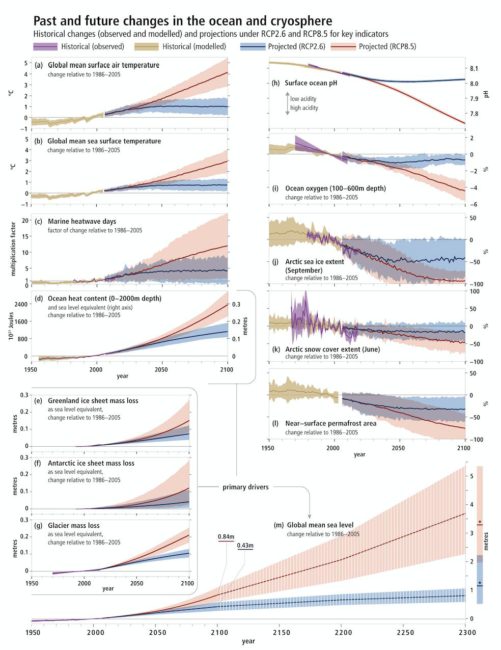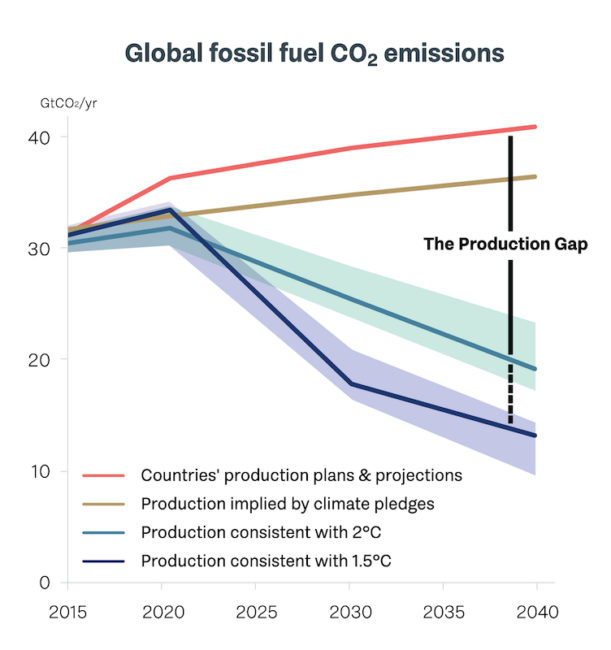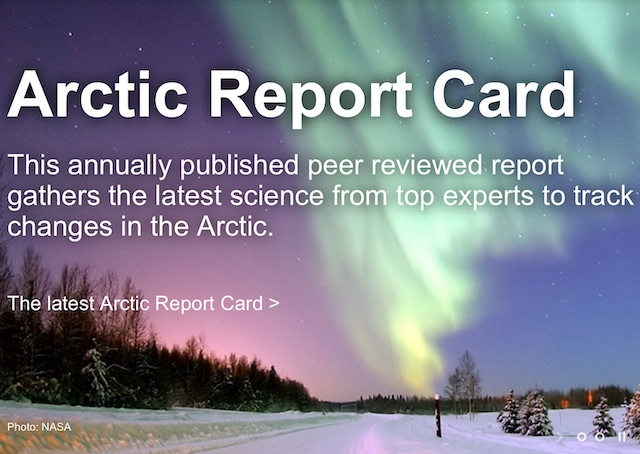
The question I’m asking myself is this – What have been the top 7 most significant Climate Change related scientific papers and reports published in 2019?
To put that another way – what is very robustly founded upon the very latest data and has been composed by the most experienced subject matter experts? Does it also effectively communicate to a wide audience?
There is of course a great deal to review, so I’ve picked a personal selection from from the various papers and reports that have caught my attention during the year.
What you have here is an insight from the cutting edge that has granted our species a better understanding of what is going on and what trajectory we are currently on.
Will we listen and respond in an appropriately meaningful manner?
That is the question that demands an answer in 2020.
Top 7 for 2019
Let’s dive directly in.
Side note: In a couple of instances, I’ve grouped several together as one item because they are related in that they focus on the same topic and/or use a common data source.
1 of 7. State of the Planet
This first one comes in two variations but utilised a common foundation. In March we got the WMO Report – the latest “State of the Planet”?
Each year the WMO (World Meteorological Organization) issues their “State of the Planet” report. Because they were founded in 1873 and represent every Meteorological Organization on the planet, all they can do is to be honest and truthful – there is no political spin in the mix. What was of note is that it contained very dire warnings and strong language. This is a very comprehensive distillation that rests firmly upon published scientific papers and cites source for everything.
I’ve included a second document here. In August, the American Meteorological Society also published a “State of the Planet” report. This is also a highly reputable 325 page report, and in a similar manner is a composite of solid evidence-based scientific information from over 475 scientific authors, plus 21 editors, all from 57 countries. (This second one might indeed be dated Sept 2019, but was made available in Aug).
Key message from both was this:
“The physical signs and socio-economic impacts of climate change are accelerating as record greenhouse gas concentrations drive global temperatures towards increasingly dangerous levels“
Links:
- Published on 28th March 2019, this WMO report is their 25th edition and can be found via this link.
- You can access the full AMS report here via this link.
2 of 7.(August) IPCC Report: Hunger, Migration and Conflict
On 8th Aug 2019, the IPCC published a Special Report on Land Use. This is an IPCC special report on climate change, desertification, land degradation, sustainable land management, food security, and greenhouse gas fluxes in terrestrial ecosystems.
Work on the report was initiated back in 2016, and was worked on by 103 experts from 52 countries who were selected as Coordinating Lead Authors. They all worked hard on pulling together this robustly evidence-based scientific report. This has a very solid foundation in the available scientific literature. It has been very carefully reviewed and refined by the best available subject matter experts.
One media outlet summed it up as follows …
The climate crisis is damaging the ability of the land to sustain humanity, with cascading risks becoming increasingly severe as global temperatures rise, according to a landmark UN report compiled by some of the world’s top scientists.
Global heating is increasing droughts, soil erosion and wildfires while diminishing crop yields in the tropics and thawing permafrost near the poles, says the report by the Intergovernmental Panel on Climate Change.
Further heating will lead to unprecedented climate conditions at lower latitudes, with potential growth in hunger, migration and conflict and increased damage to the great northern forests.
Link:
- You can find it all here and also download individual sections.
- There is an exec summary, that you can find here
3 of 7.(Sept) IPCC Special Report on the Ocean and Cryosphere in a Changing Climate (#SROCC)
Published on 25th Sep 2019, this is a very comprehensive and important document. The statistics behind it will give you a sense of this …
- Authors: prepared by 104 leading scientists who acted as Coordinating Lead Authors, Lead Authors and Review Editors
- Author Locations: They were from 36 countries around the world.
- References: 6,981 scientific publications are referenced in SROCC
- Review Comments: Drafts received a total of 31,176 comments from expert reviewers and governments in 80 countries
A better way of underscoring the importance here is to quote one of the lead authors …
this in a nutshell (if a very dense one) is why we scientists are so totally freaked out: it indicates the changes in the environment (caused by GH gas emissions) are going to get much, much worse if we don’t get our shit together.

Links:
- SROCC Home Page
- The Official Press Release
- SROCC Factsheet
- Download page – Contains link to the full report (39Mb), or sections if you prefer.
4 of 7.(Sept) Climate Action Summit Report: Impacts are accelerating
As input for the UN sponsored climate action summit that took place on 23rd September the world’s leading climate science organizations joined forces to produce a landmark new report … “United In Science”.
The report was coordinated by the World Meteorological Organization and compiled under the auspices of the Science Advisory Group to the UN Secretary-General’s Climate Action Summit. It aimed to present a “transparent envelope” of authoritative and actionable cutting-edge science.
The synthesis report consisted of short summaries from contributing agencies: the World Meteorological Organization, UN Environment, Global Carbon Project, the Intergovernmental Panel on Climate Change, Future Earth, Earth League and the Global Framework for Climate Services.
Emerging here is a growing recognition that climate impacts are hitting harder and sooner than climate assessments indicated even a decade ago.
Links:
- The full report can be found here.
5 of 7.(Nov) The Production Gap discrepancy
The 70 page United Nations Production Gap report was published in Nov as a heads-up to those attending COP25. The key message was that Governments are planning to produce about 50% more fossil fuels in 2030 than would be consistent with limiting warming to 2°C and 120% more than would be consistent with limiting warming to 1.5°C. Think of it as a “Unless this changes then we are truly f**ked” report.

Related to the above, in the sense that it carried the same message, was the publication of the UN emissions gap report. This highlighted these main facts …
- Greenhouse Gas emissions continue to rise, despite scientific warnings and political commitments
- G20 members account for 78 per cent of global GHG emissions
- Although the number of countries announcing net zero GHG emission targets for 2050 is increasing, only a few countries have so far formally submitted long-term strategies to the UNFCCC
- The emissions gap is large
- Dramatic strengthening of the NDCs is needed in 2020
- Enhanced action by G20 members will be Necessary
- Decarbonizing the global economy will require fundamental structural changes
Links:
- UN Production Gap report …
- UN Emissions Gap Report …
- The full report (it is not a small document)
- The Exec Summary
6 of 7.(Nov) WMO Bulletin: Greenhouse gases Continue to Rise
November also saw publication of the latest WMO Greenhouse Bulletin. This is basically a summary of what is actually happening within the atmosphere of our planet.
The rather shocking insight was this – Despite all the green initiatives, CO2 levels within our Atmosphere are still climbing upwards. There has been no decline at all.
Links:
- Published 25th Nov 2019 – WMO Greenhouse Gas Bulletin
- WMO Press Release
7 of 7.(Dec) The Arctic Report card 2019

December (this month) saw the publication of the latest Arctic Report card. This Report Card is an annual volume of original, peer-reviewed environmental observations and analysis of a region undergoing rapid and dramatic change. Compiled by 81 scientists from 12 nations.
The essence of this latest report is this – Arctic ecosystems and communities are increasingly at risk due to continued warming and declining sea ice.
Links:
- Arctic Report Card – Dec 2019 –
- Full PDF is available
And that’s it, those are my top 7 for 2019.
Why did I lean towards these reports?
Basically because they do several things …
- The are all standing upon the latest robust peer-reviewed scientific papers, and are themselves also peer-reviewed publications
- The effectively sum things up well and communicate beyond the latest understanding to a wider audience
One Last Quote
I can’t simply leave it at that. I have one quote that stands out. If you take nothing else away from all of these reports, then grasp a firm hold of this …
“We will only be able to keep global warming to well below 2°C above pre-industrial levels if we effect unprecedented transitions in all aspects of society, including energy, land and ecosystems, urban and infrastructure as well as industry. The ambitious climate policies and emissions reductions required to deliver the Paris Agreement will also protect the ocean and cryosphere – and ultimately sustain all life on Earth,”
“The more decisively and the earlier we act, the more able we will be to address unavoidable changes, manage risks, improve our lives and achieve sustainability for ecosystems and people around the world – today and in the future,”
Debra Roberts, Co-Chair of IPCC Working Group II.
